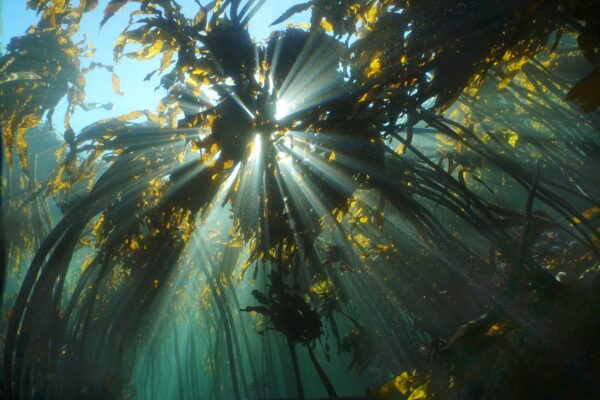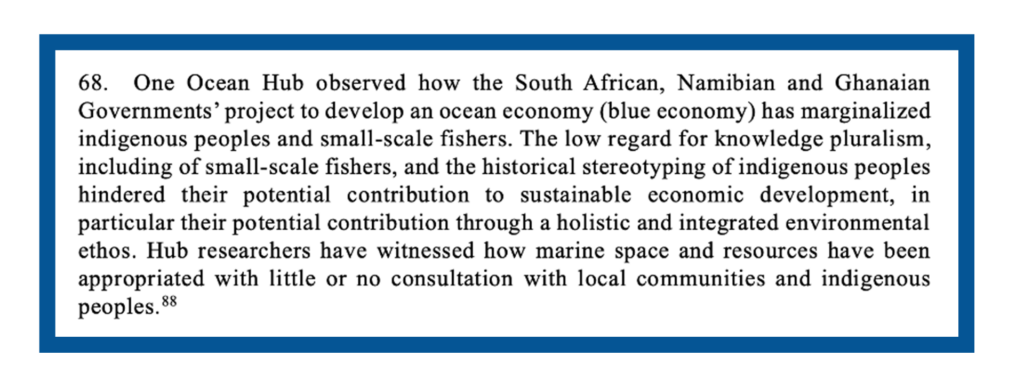Hub evidence relied upon by the UN Special Rapporteur on Cultural Rights

The evidence submitted by a team of One Ocean Hub researchers on threats to cultural rights arising from unsustainable and exclusionary blue economy initiatives has been included in the 2022 report titled “Development and cultural rights: the principles” by UN Special Rapporteur in the field of cultural rights, Alexandra Xanthaki (UN Doc A/77/290). This blog post reflects on the findings of the Rapporteurs and their significance for ongoing research under the Hub.
Culture, human rights and the SDGs
In her 2022 report, the Special Rapporteurs sought to:
- addresses the role of culture in sustainable development, with a view to assessing how cultural diversity and cultural rights have been mainstreamed in the 2030 Agenda for Sustainable Development so far;
- taking stock of the experiences in leveraging cultural resources and cultural rights in the pursuit of a more sustainable development, as well as the weaknesses encountered in doing so; and
- highlighting areas where increased cultural awareness may contribute to reaching the Sustainable Development Goals during the second half of the implementation timeline of the 2030 Agenda.
The report also states at the outset the premise (para 1) that:
“Cultural rights are indispensable to sustainable development. Development will only be sustainable if it is shaped by the values of the people that it involves and the meaning that they ascribe to it, protects their resources and uses their heritage in all its dimensions – tangible, living and natural. A human rights approach with a strong consideration for cultural rights is both a framework for and a guarantee of success for any development agenda.”
The Rapporteur also underscored that cultural rights and cultural diversity are essential to ensure that development is sustainable and gives a voice to marginalised people affected by development processes (para 5). She also emphasised that respect for cultural rights is part and parcel of “leaving no-one behind”, recalling that (paras 9-10):
“Cultural rights protect the right of each person individually, in community with others and collectively, to develop and express their humanity, their world views and the meanings they give to their existence and their development, including through, inter alia, values, beliefs, convictions, languages, knowledge and the arts, institutions and ways of life. Cultural rights also protect the cultural heritage of the individual and groups and the resources that enable such identification and development processes.”
Evidence from the One Ocean Hub was then cited by the Rapporteur in stating that “sustainable development cannot be separated from the recognition of individual and collective cultural rights, including spiritual and heritage rights” (para 20), although the prevailing development practices are lacking consideration of cultural rights, different values and worldviews, due to inequalities and stereotypes that prevent transformative change and are based on colonial legacies that have shaped dominant conceptions of development imposing a paradigm of “progress” that is not compatible with affected communities’ understandings (para 21 and 25-26). She thus called for decolonising and democratising sustainable development, including by unearthing and acknowledging historical injustices committed in the name of progress and in violation of the cultural rights of local populations (paras 25-25).
Threats to culture are threats to public participation
The Special Rapporteur identified several threats to cultural rights arising from sustainable development initiatives, noting how development can be used for or resulting in the eradication of the cultural identify of local populations, in particular through land-grabbing, forced displacement and resettlement, and the destruction of cultural heritage (para 63). She also noted that these threats can arise from blue economy projects, relying extensively on the Hub’s evidence:

In addition, the UN Special Rapporteur recognised that nature conservation can also threaten cultural rights, including the creation and management of protected areas due to significant religious and cultural loss for resource-dependent communities, whose cultural and spiritual identities are often inextricably intertwined with their territories and resources, which in turn are essential to their survival as indigenous peoples (para 71). She pointed out that this can also be the case of UNESCO World Heritage Sites, which chimes with research undertaken in South African by Hub researchers and the Empatheatre collective. She emphasised the need to ensure continued access to territories and resources for communities that are entitled to their right to cultural development (para 74).
In effect, the Rapporteur noted that in South Africa “environmental impact assessments often fail to assess the cultural significance of specific natural resources to communities as a result of inadequate consultation with them”, including failure to seek the free, prior and informed consent of concerned communities – based on a contribution from Natural Justice (para 44), that is among the Hub research and impact partners in South Africa.
The UN Special Rapporteur, therefore, concluded that:
“At a minimum, development that is respectful of rights requires meaningful consultation with and full and effective participation of those likely to be affected in their way of life and in their rights, including indigenous peoples, minorities, peasants, and women and young people. Respecting consultation and participation rights helps to guarantee that the cultural rights of all are respected in development processes but also creates space for culturally informed development approaches.” (para 79)
This is similar reasoning to that arising from South African courts that have relied on Hub evidence to protect the intangible cultural heritage of small-scale fishers and indigenous peoples to the seabed, and on the basis also determined insufficient protection of their procedural rights. The report therefore relied on Hub evidence in this connecting, noting that “increased recognition of the legitimacy and knowledge of indigenous peoples” in South Africa (para 43).
The transformative role of cultural heritage and arts
The UN Special Rapporteur also shared words and experiences of hope in relation to the transformative role of culture and arts in pursuing fair and truly sustainable development. She underscored that incorporating different knowledge systems into sustainable development “is an epistemic challenge that, if addressed, will lead to positive results” and can help “counterbalancing the prevailing economic model with examples of alternative models promotes cultural diversity” (paras ).
In particular, she supported:
- creative projects that address the challenges of development, utilise decolonisation processes, and recognise the complexities of traditional development paradigms rooted in colonialism, such as theatre (para 55) – which chimes with the Empatheatre methodology used under the One Ocean Hub;
- cost-effective creative solutions that “imaginatively utilise the resources around them to maximise impact” – which chimes with the approach of the Hub’s Deep Fund;
- cultural sector’s contributions to sustainable development that support a cross-cutting approach to all goals and policies (para 61).
She therefore called on States to:
- ensure funding in official development assistance for cultural programmes that support own development needs; and
- value outputs of creative projects even if they cannot be easily quantified, without reducing their scope to only certain types of outputs that can be marketed and measured (para 59).
These are indeed messages that the One Ocean Hub has been sharing with the international ocean community, as well as ocean and development funders and human rights practitioners. We are also increasingly publishing on the value of arts and cultural heritage for transdisciplinary research (see here, here and here).
Outlook
Overall, the 2022 report confirmed the need to integrate a human-rights-based approach that includes cultural rights throughout the implementation and monitoring of the SDGs, including SDG14 and the need to rely on the indivisibility, universality and interdependence of all human rights to ensure coherence in planning, implementation or impact assessment and evaluation (para 96). This is one of the key policy messages arising also in our research with small-scale fishers’ human rights, together with the UN Food and Agriculture Organisation and the UN High Commissioner for Human Rights.
The Rapporteur also underscored the need for sustainable development to be self-determined and community-led, as it is “not sufficient for development to be culturally sensitive or culturally appropriate; it should be contextualised to specific cultural environments and seek to fully align” (para 27), which chimes with our findings about the major shortcomings in national blue economy policies.
Finally, the Rapporteur cautioned (para 97) against
“development” policies and strategies reflecting dominant cultural viewpoints or those of the most powerful sectors of society, with historic ties to colonialism and domination, are designed and implemented to the detriment of the most vulnerable in a manner that impedes the future sustainable development and survival of these persons and communities and probably, in the longer term, of humanity.”
One way to prevent this is integrating in impact assessments consideration of cultural rights, including living heritage or the cultural significance of affected natural resources, with a view to seeking free, prior and informed consent, consultation and active participation of the persons and communities affected directly or indirectly (para 97). This chimes with ongoing Hub research on the international obligations on integrated environmental and socio-cultural assessments, as well as research on integrating intangible cultural heritage and customary laws into ocean, climate and fisheries management (see also here, here and here) and the role of marine sciences and social sciences to that end.
Header Photo: Craig Foster